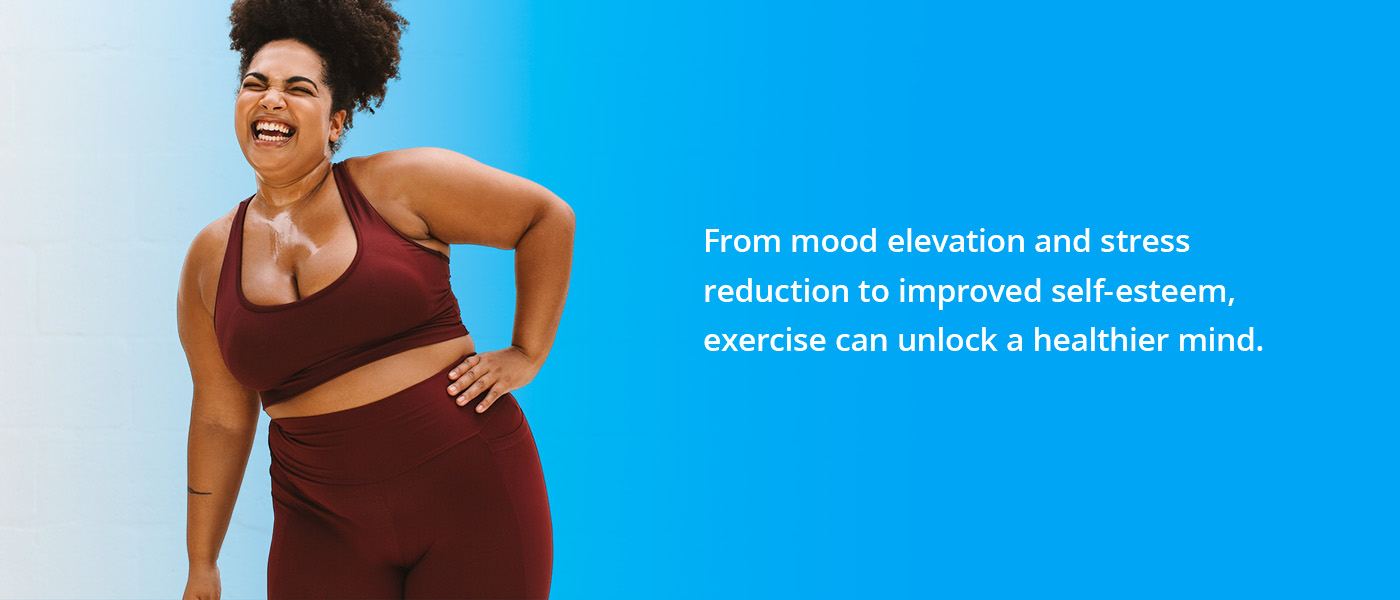In pursuing a fulfilling life, mental well-being cannot be overlooked. Our minds are an intricate tapestry of emotions, thoughts and experiences, shaping our perceptions and responses to the world around us. In this demanding modern world, the burden of stress, anxiety and depression can become all-encompassing, taking a toll on our overall health and happiness.
Exercise and movement can help us find joy in times of stress and feel a sense of accomplishment in caring for our minds and bodies. Continue reading to learn how exercise is good for anxiety in this guide on the impact of exercise on mental health.
How Does Physical Activity Reduce Stress?
Life can be an arduous journey, filled with challenges that can often weigh heavily on our minds. The burden of stress, anxiety and depression can manifest in various ways, hindering our ability to lead fulfilling lives. However, there is a powerful tool at your disposal: exercise. Engaging in regular physical activity isn’t just about improving your physical health — exercise also provides a sanctuary for your mental well-being. Learn how exercise reduces stress below.
Release of Feel-Good Neurotransmitters
When you exercise, your brain rewards you with a cascade of “feel-good” neurotransmitters, such as endorphins, serotonin and dopamine. These natural chemicals act as mood elevators, reducing stress and anxiety levels while inducing happiness and relaxation. The result is an immediate boost in your overall well-being, making exercise an effective means of combating the daily struggles that life throws your way.
Stress Reduction and Cortisol Regulation
It’s true that stress is an inescapable part of life, but how we deal with stress can make all the difference. Exercise lets us release pent-up stress, providing an effective and healthy way to release tension. Have you ever gone for a walk after a frustrating day at work or ran on the treadmill when you feel a rush of nerves? Then you’re already familiar with how exercise reduces stress!
Regular physical activity helps regulate cortisol levels, the hormone associated with stress. Reducing cortisol production via exercise helps us achieve a more balanced mental state, enhancing our ability to cope with life’s challenges.
Enhanced Brain Function and Cognitive Abilities
Exercise is a remedy for mental distress and a booster of brainpower. Getting physical exercise is a healthy way to combat stress, as it has been linked to improved cognitive functions like memory, attention and learning abilities.
Exercise boosts blood flow to the brain, which leads to nourished brain cells and the growth of new neurons. This remarkable aspect of exercise empowers you to face challenging tasks with greater clarity, which is beneficial for all parts of life.
Increased Empowerment and Confidence
Engaging in regular physical activity can help your self-confidence soar. You may feel a sense of accomplishment in meeting fitness goals and overcoming physical challenges that will spill over into other aspects of life. As your body grows stronger, so will your mind — you can feel newly empowered and ready to tackle life’s hurdles with the same determination that you bring to your workouts.
6 Ways Exercise Benefits Your Mental Health

7
When you understand the mental benefits of exercise, you could feel more motivated to start on the journey. From mood elevation and stress reduction to improved self-esteem, exercise can unlock a healthier mind, as well as a healthier body. Explore six ways that exercise benefits your mental health.
1. Mood Elevation and Stress Reduction
One of exercise’s most immediate and noticeable effects on mental health is its ability to increase positivity and reduce stress. As you engage in physical activity, your brain releases endorphins, serotonin and dopamine — neurotransmitters responsible for feelings of happiness, contentment and relaxation. These chemicals act as natural mood boosters, combating stress and anxiety and fostering overall emotional well-being. The result is a lighter, more positive outlook on life, enabling you to tackle challenges with renewed vigor.
2. Anxiety and Depression Management
Exercise has shown remarkable efficacy in managing anxiety and depression. By engaging in regular physical activity, you create a distraction from negative thought patterns and rumination, breaking the cycle of distress. The release of endorphins during exercise helps mental health as it helps to reduce feelings of sadness and hopelessness, providing a sense of relief and emotional resilience. Moreover, physical activity promotes neural growth in the brain regions associated with mood regulation, enhancing its antidepressant and anxiolytic effects.
3. Increased Self-Esteem and Body Image
A consistent exercise routine can significantly impact your self-esteem and body image. As you progress and witness improvements in your physical fitness, you’ll develop a more positive perception of your body and its capabilities. This enhanced self-perception fosters greater self-confidence and self-acceptance, empowering you to navigate life’s challenges with healthy self-worth.
4. Better Sleep Quality
Adequate sleep is essential for maintaining good mental health. Engaging in regular exercise can contribute to better sleep quality by promoting relaxation and reducing insomnia. Physical exertion during exercise helps regulate your body’s internal clock, improving sleep patterns and ensuring you wake up feeling refreshed and rejuvenated. With a well-rested mind, you’ll be better equipped to face daily stressors and emotional challenges.
5. Social Connection and Support
Exercise often provides an opportunity for social interaction, whether through group fitness classes, sports teams or workout buddies, thereby giving mental health benefits. Engaging in physical activity with others fosters a sense of camaraderie and belonging, reducing feelings of loneliness and isolation. The social support system built around exercise can serve as a valuable source of encouragement and motivation, uplifting your spirits during difficult times.
6. Stress Resilience and Coping Skills
Through exercise, you can develop valuable stress resilience and coping skills. Physical challenges during workouts mirror the mental challenges of daily life, teaching you to push through difficulties and embrace a growth mindset. The discipline required to maintain a regular exercise routine reinforces positive habits and instills a sense of control over your life, even in the face of uncertainty.
Elevating Your Mood, One Rep at a Time
As you do the best you can to manage life’s inevitable stressors, we are here to walk alongside you, offering guidance, compassion and understanding. Our goals are your goals, and we are committed to helping you weather any crises, navigate personal struggles and build resilience to face life’s challenges head-on.
With its many benefits, exercise is not just a means to improve physical health— it is a sanctuary for mental well-being. Exercise empowers you to lead a more fulfilling life through its ability to elevate mood, reduce stress and enhance self-esteem. We intend to equip you with the skills, tools and support necessary to achieve all you wish for in life.
Speak to Merrimack Valley Psychological Associates about other ways to reduce stress and improve mental health.


